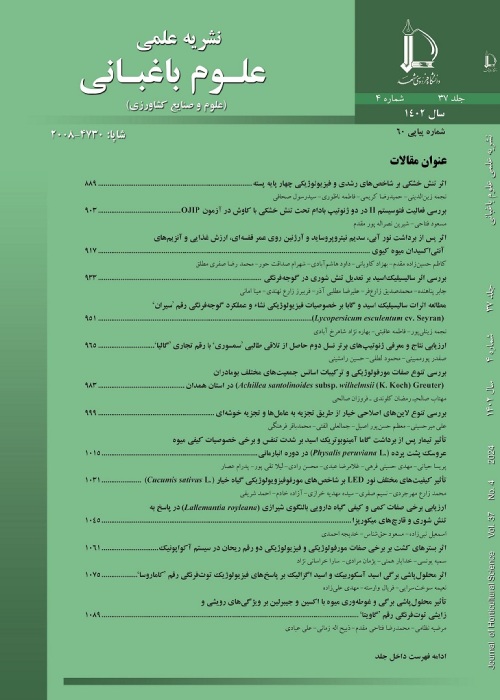Engineering of Secondary Metabolites in Cell Suspension Culture of Citrullus colocynthis (L). Schrad. with the Presence of Biological and Non-biological Stimulants
Medicinal plants have historically been one of the main sources of medicine and pharmacy in most parts of the world, that among these plants, we can mention the species Citrullus colocynthis L. Schrad. Cell suspension culture is a widely used method to increase the rate of secondary metabolites. The secondary metabolites of plants, are species compounds often produced during a certain period of growth and development and have important ecological functions in plants. They induce the ability of plants to cope with herbivores, microbial pathogens, adsorbents, and seed-spreading organisms. Also, due to the role of fungal elicitors to increase the rate of secondary metabolites in plants, in this study, we studied the role of the endophytes Alternaria solani. Fusarium sp. and Setosphaeria rostrata extracted from Citrullus colocynthis L. Schrad were collected from different regions of Hormozgan province as bio-elicitors in a cell suspension culture medium.
The study was performed based on a factorial experiment in a completely randomized design with two factors (the first factor had two levels of different hormonal composition and the second factor had eight levels of endophytic fungal extracts) with three replications in the biotechnology laboratory of Hormozgan University and the results were analyzed statistically using SAS 9.4 software. To produce the callus and culture of cell suspension under hormone treatment, watermelon seeds were first disinfected for a period of time and then the seeds were transferred to a culture medium containing MS and placed in a suitable incubator for seed germination. After germination and leaflet production, pieces with an area of approximately 1 mm2 were separated from the primary leaves and for callus formation were transferred to Petri dishes containing MS medium (3% sucrose, 0.8% agar), with two levels of 1mg 2,4-D + 1mg BA and 1mg 2,4-D + 1mg kin and placed in a suitable incubator for three weeks. Three fungal endophytes Alternaria solani, Setosphaeria rostrata, and Fusarium sp. were transferred separately to PDA (Potato Dextrose Agar) culture medium to prepare the bio elicitor and placed at 30 ° C for 7 days. From 7-day cultures, 1 cm2 of mycelium was isolated and inoculated into 150 ml of PDB (Potato Dextrose Broth) culture medium. The cultured cells were stored at 30 ° C in a 500 ml Erlenmeyer flask and placed on a shaker for 7 days at 120 rpm. The fungal cells were isolated and dried at 65 ° C for 24 hours. The powder from the dried cells was dissolved in water (10 g / l) and autoclaved for 20 minutes at 121 ° C. The extracts of these cells were finally used as a bio elicitorto study the change in the number of secondary metabolites. After that, the growth rate of cells in cell suspension culture was measured before and after the application of fungal extract. Parameters such as total phenol content, antioxidant activity, and flavonoids were also studied.
The results showed that the treatment combinations of 1mg 2,4-D + 1mg BA and inoculation of the plant with three fungi, the amount of phenol and flavonoids increased by 62.11% and 49.18%, respectively, compared to the control and at the levels of 1% and 5% probability were significant and was observed in the combination of hormonal treatment 1mg 2.4-D + 1mg Kin and inoculation of three fungi, the amount of antioxidant production increased by 62.78% compared to the control and at the levels of 1% probability was significant. The results indicated that the cell extraction of the fungal endophyte Alternaria solani, Fusarium sp., and Setosphaeria rostrata under condition hormonal treatment can be used as an effective stimulant in increasing the amount of secondary metabolites (phenol, flavonoids and antioxidant) of Citrullus colocynthis L. Schrad.
It was revealed that by adding the elicitor to the culture medium, cell growth was increased. The results showed that the combination of three types of endophytic fungi Alteynaria solani, Setosphaeria rostrata and Fusarium sp. led to a significant increase in cell dry weight compared with the control treatment. Also, an increase in cell growth was observed even when a fungal extract was used alone. The amount of metabolites in cells treated with fungal extracts (fungal elicitors) was significantly higher than metabolites produced in the control. According to the results of this experiment, using a combination of three fungal extracts was the best treatment to increase the metabolite production in the culture of cell suspension of Citrullus colocynthis L. Schrad.
- حق عضویت دریافتی صرف حمایت از نشریات عضو و نگهداری، تکمیل و توسعه مگیران میشود.
- پرداخت حق اشتراک و دانلود مقالات اجازه بازنشر آن در سایر رسانههای چاپی و دیجیتال را به کاربر نمیدهد.


